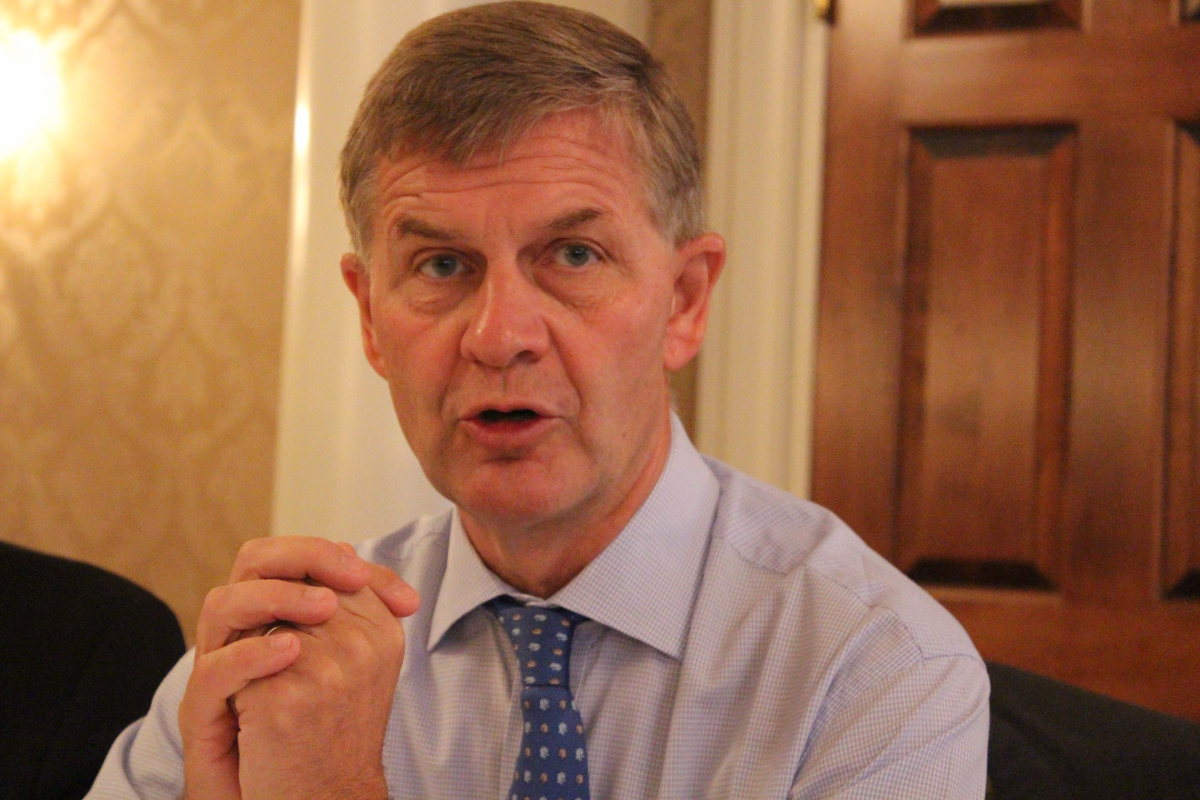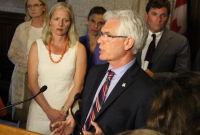Support strong Canadian climate journalism for 2025
Erik Solheim doesn’t mince his words when it comes to industry giants that fail to embrace change in the global economy.
Solheim, a former Norwegian cabinet minister, is the new top boss of the United Nations Environment Programme. Speaking at an early-morning breakfast with a mixed crowd of environmental stakeholders, policy experts and media in Ottawa, he said that Canada’s fossil fuel companies need to take stock of what’s happening before it’s too late for them.
“Many of you will remember Kodak,” Solheim said at the event hosted by the Winnipeg-based International Institute for Sustainable Development. “They didn't believe in digital photography. Where is Kodak now? In industrial museums somewhere.”
Ottawa is the first stop on Solheim's tour of North America after he was appointed a few months ago as executive director of the UN agency based in Nairobi, Kenya.
His message was also delivered in a series of private meetings with federal cabinet ministers - Environment and Climate Change Minister Catherine McKenna, Global Affairs Minister Stéphane Dion and International Development Minister Marie-Claude Bibeau - and comes at a time when Canada’s energy debate has been hijacked by arguments about new pipelines to Canada’s east and west coasts.
“The world is full of companies that oppose change and many of them are out of business now.”
Solheim used the example of cell phone maker Nokia.
“Basically because they didn’t believe in touch screens," he said, drawing some chuckles from the room. "Steve Jobs believed in touch screens. The Koreans believed in touch screens. Nokia didn't believe in it and they are out.”
Energy companies, along with some business and union leaders say that new pipelines such as TransCanada Corp.'s Energy East, Kinder Morgan's Trans Mountain Expansion and Enbridge's Line 3 replacement are key to boosting fortunes for slumping oil and gas companies. On the other side, many environmentalists, First Nations leaders and politicians are skeptical of the long-term economic benefits of new pipelines, while warning the projects pose unacceptable risk of oil spills and would push Canada’s climate change goals out of reach.
“If Canada doesn’t embrace change, it will lose,” he said. “For economic and environmental issues combined. Of course some fossil fuels will remain a source of energy for some time, but the changes are coming much faster than anticipated. The price of solar is going down much faster than anyone thought. And energy efficiency provides solutions to a lot of issues if we really embrace it. So embrace the change.”
Rumours circulating in Ottawa have spread across the country suggesting that Prime Minister Justin Trudeau’s government wants to approve at least one major new pipeline project to support Alberta’s NDP government. Some federal Liberals believe this would prevent Conservatives from regaining control of the oil-rich province, which is home to the oilsands, the world’s third largest reserve of oil — after Saudi Arabia and Venezuela — and Canada’s fastest growing source of greenhouse gas emissions.
Without weighing directly into the country’s pipeline debates, Solheim said Canadians would have to create space for Trudeau to make bold decisions.
“We need to make people out there (to be) enthusiastic because if there’s not a citizens movement, for (sustainable) development and environment it’s very difficult for political leaders to do it,” he said. “I mean business leaders and political leaders, even if they are of the caliber of Mr. Trudeau, need the support of the people. So we must speak with people and make people enthusiastic for the environment.”
He also stressed the importance of working closely with businesses to encourage more leadership and solutions. He said that last year’s international climate summit in Paris achieved results because some important companies said they were willing to take action, recognizing the potential to make money and create jobs by seizing the green agenda.
“There has been a long-term view in the UN and in the development of the environmental community and fostered maybe by people like me, coming from the left, that business was something dirty, something you should be afraid of, rather than an enormous opportunity for change,” he said.
Solheim said he sees a fast-growing list of companies and countries that are leading the way to the future.
This report was made possible thanks to reader subscriptions. Please subscribe today.






Comments
Attention: Mike deSouza
Acceptance of the pipelines could and should result if there was a ban on what they are wanting to ship , namely, Diluted Bitumen (DILBIT) because it sinks in fresh and salt water . The risk of a leak is too high and FNs will not accept the risk to the coastal waters and their salmon rivers etc.The Port of Vancouver and surrounding communities won't accept it too.There is a First Nation Company, however , Eagle Spirit Energy(ESE) , whose President Calvin Helin is the son of a coastal FN 's chief, with a solution . ESE is willing and is planning to run a bitumen pipeline to Prince Rupert from the Bituminous Sands near Fort McMurray .This pipelin will not contain DILBIT. 95 per cent of the chiefs of the First Nations along the wilderness route across Alberta and BC have accepted this proposal.Fully or Partially upgraded Bitumen is acceptable as it floats like regular crude oil.Also they suggested an Energy Corridor.
"KEY ISSUES
Sufficient approvals from inland First Nations along the proposed route for an integrated energy corridor containing an oil pipeline, a natural gas pipeline, a natural gas liquids pipeline, electric power transmission lines, fibre-optic cables, and access roads.
Sufficient approvals from coastal First Nations for oil, LNG, and natural gas liquids marine terminals in the Prince Rupert area.
Agreement from the Government of British Columbia that an integrated northwest Canada energy corridor meets its five conditions for approval of a heavy oil pipeline through BC.
Waiver of the proposed federal tanker moratorium in northern waters off BC’s coast for terminals in the Prince Rupert area.
Sufficient agreement from stakeholders that an integrated northwest Canada energy corridor is the best solution to the environmental and ecological issues surrounding resource development.
Canadian Domestic Political Considerations
This proposed northwest Canada energy corridor respects the concerns, needs, legal responsibilities to, and desires of, First Nations, as well as environmental concerns, far better than any of the other oil pipeline proposals to Canada’s west coast – Enbridge’s Northern Gateway pipeline proposal and Kinder Morgan’s Trans Mountain pipeline expansion proposal. It ties in very well with current Canadian federal government priorities to improve the economic and social well-being of First Nations.
There must be direct, long-term economic benefit to First Nations from pipelines and facilities on First Nations lands. This would be achieved through federal loans providing a measure of capital participation by affected First Nations. There would also be significant benefit to First Nations, as well as projecvt proponents, through their involvement and assistance designing, constructing, operating, and managing the energy corridor and associated pipelines and facilities with training provided by industry.
Co-ordinated leadership for an integrated northwest Canada energy/transportation corridor will challenge Canadians. It is a complex mega-project that will require the leadership and support of the Canadian federal government under Prime Minister Justin Trudeau and the federal Ministers of Transport, Natural Resources, Environment, Infrastructure, and Indigenous and Northern Affairs, the provincial governments of Premiers Clark and Notley of British Columbia and Alberta, First Nations, affected local municipalities, BC Hydro, Alberta Energy, power companies, and, of course, companies in the oil and gas industry." Taken from Mike Priaro : "A Western Canada Energy Corridor"The link to the complete paper is: https://www.behance.net/gallery/35336649/A-WESTERN-CANADA-ENERGY-CORRID…
Attention: Mike deSouza
Acceptance of the pipelines could and should result if there was a ban on what they are wanting to ship , namely, Diluted Bitumen (DILBIT) because it sinks in fresh and salt water . The risk of a leak is too high and FNs will not accept the risk to the coastal waters and their salmon rivers etc.The Port of Vancouver and surrounding communities won't accept it too.There is a First Nation Company, however , Eagle Spirit Energy(ESE) , whose President Calvin Helin is the son of a coastal FN 's chief, with a solution . ESE is willing and is planning to run a bitumen pipeline to Prince Rupert from the Bituminous Sands near Fort McMurray .This pipelin will not contain DILBIT. 95 per cent of the chiefs of the First Nations along the wilderness route across Alberta and BC have accepted this proposal.Fully or Partially upgraded Bitumen is acceptable as it floats like regular crude oil.Also they suggested an Energy Corridor.
"KEY ISSUES
Sufficient approvals from inland First Nations along the proposed route for an integrated energy corridor containing an oil pipeline, a natural gas pipeline, a natural gas liquids pipeline, electric power transmission lines, fibre-optic cables, and access roads.
Sufficient approvals from coastal First Nations for oil, LNG, and natural gas liquids marine terminals in the Prince Rupert area.
Agreement from the Government of British Columbia that an integrated northwest Canada energy corridor meets its five conditions for approval of a heavy oil pipeline through BC.
Waiver of the proposed federal tanker moratorium in northern waters off BC’s coast for terminals in the Prince Rupert area.
Sufficient agreement from stakeholders that an integrated northwest Canada energy corridor is the best solution to the environmental and ecological issues surrounding resource development.
Canadian Domestic Political Considerations
This proposed northwest Canada energy corridor respects the concerns, needs, legal responsibilities to, and desires of, First Nations, as well as environmental concerns, far better than any of the other oil pipeline proposals to Canada’s west coast – Enbridge’s Northern Gateway pipeline proposal and Kinder Morgan’s Trans Mountain pipeline expansion proposal. It ties in very well with current Canadian federal government priorities to improve the economic and social well-being of First Nations.
There must be direct, long-term economic benefit to First Nations from pipelines and facilities on First Nations lands. This would be achieved through federal loans providing a measure of capital participation by affected First Nations. There would also be significant benefit to First Nations, as well as projecvt proponents, through their involvement and assistance designing, constructing, operating, and managing the energy corridor and associated pipelines and facilities with training provided by industry.
Co-ordinated leadership for an integrated northwest Canada energy/transportation corridor will challenge Canadians. It is a complex mega-project that will require the leadership and support of the Canadian federal government under Prime Minister Justin Trudeau and the federal Ministers of Transport, Natural Resources, Environment, Infrastructure, and Indigenous and Northern Affairs, the provincial governments of Premiers Clark and Notley of British Columbia and Alberta, First Nations, affected local municipalities, BC Hydro, Alberta Energy, power companies, and, of course, companies in the oil and gas industry." Taken from Mike Priaro : "A Western Canada Energy Corridor"The link to the complete paper is: https://www.behance.net/gallery/35336649/A-WESTERN-CANADA-ENERGY-CORRID…
Mr Reid “Gouverner c’est prévoir”
The cost of batteries in 2007 was $1000/kWh, today 9 years later it varies around $200 to $400, it does not take much imagination to predict that in 2020 the cost may very well be around $100/kWh with better performance.
The Electric Vehicle EV will get cheaper to manufacture than Internal Combustion Vehicle ICEV faster than we think and ICEV will be history, that will take care of diminishing demand of petrol for transport.
Same thing for solar energy, the cost diminishes and the performance improves all the time; it already costs less to generate electricity with solar energy than gaz without destroying the environnement. That will take care of diminishing demand of petrol for other sectors.
In December, 2 hours of sun produce enough solar energy to supply the whole province of QC for one year from a surface of 0.1% of the province, it must be similar in AB.
I prefer a severe Solar Energy spill, it is called a nice day.
Canada has so many sources of energy, what excuse do we have in wanting to increase our dependancy on petrol (especially extreme petrol like tar sand and fracking) which puts all the other industries at risk, delays innovation and job creation in renewable energy.
There is no job on a dead planet.
What will Canada do with all this poison inside the rusty and defective pipelines ready to burst in our drinking water after we get stuck with stranded assets?
Thanks Mr De Souza for inspiring articles.
Mr Reid, the issue is that the planet cannot withstand the effects of what goes through the pipelines we already have and it is utter madness to pretend we can drastically increase output while saving ecosystems. FN also want to hunt, trap, gather foods and have salmon, do they not? Do those advocating this project like drinkable water, or will they welcome the fracking, poisoned water, and earthquakes as well? There are many ingenious and green energy programs around the world that harm no other species. THAT is what we should all be working on.